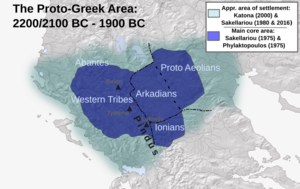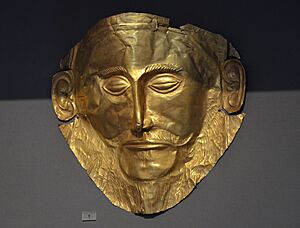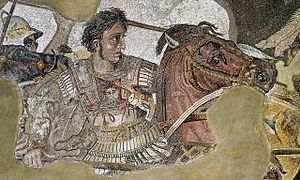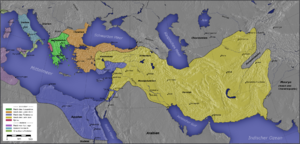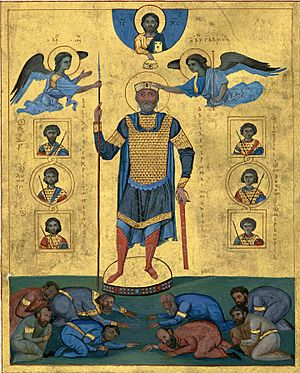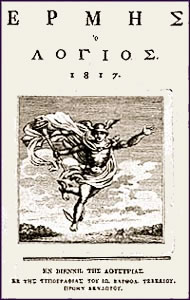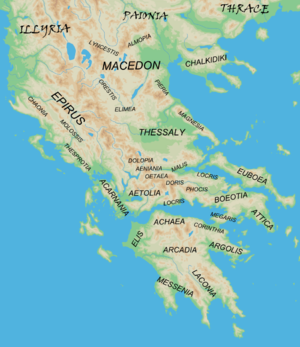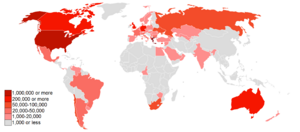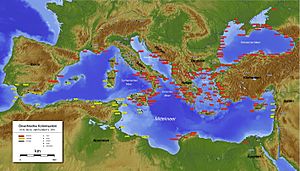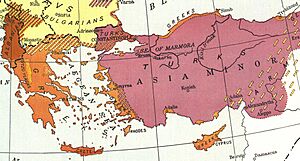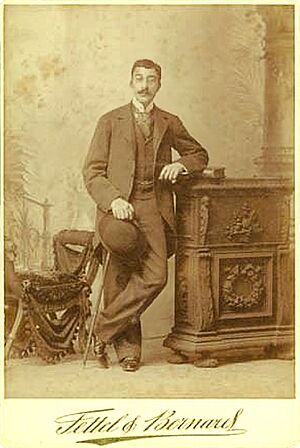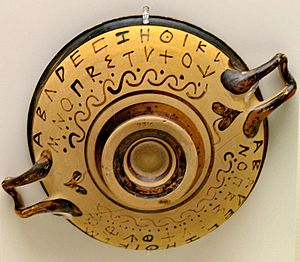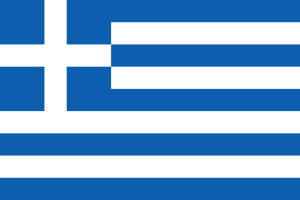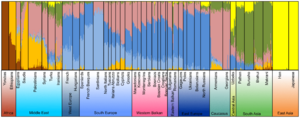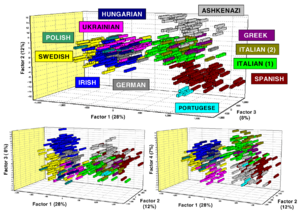Greeks facts for kids
| Έλληνες | |
|---|---|
| Total population | |
| c. 14–17 million | |
| Regions with significant populations | |
(2011 census) (2011 census) |
|
| 1,279,000–3,000,000a (2016 estimate) | |
| 449,000b (2021 estimate) | |
| 424,744 (2021 census) | |
| 290,000–345,000 (2011 estimate) | |
| 271,405c (2016 census) | |
| 138,000 (2011 estimate) | |
| 110,000–200,000d (2013 estimate) | |
| 110,000 | |
| 100,000 | |
| 91,000 (2011 estimate) | |
| 85,640 (2010 census) | |
| 50,000e | |
| 35,000 (2013 estimate) | |
| 35,000 (2011 estimate) | |
| 28,856 (2021) | |
| 25,000–28,000 (2011 census) | |
| 4,000–49,143f | |
| 20,000–30,000 (2013 estimate) | |
| 24,736 (2012 census) | |
| 23,485 (2023 census) | |
| 1,356 (2011 census) up to 28,500 (estimate) | |
| 15,000 (2011 estimate) | |
| 12,000 | |
| 11,000 (2015 estimate) | |
| 10,000 (2013 estimate) | |
| 9,500 (2000 estimate) | |
| 8,846 (2011 estimate) | |
| est. 2,478 to 10,000, possibly up to 50,000 | |
| 5,261 | |
| 4,454 (2016 census) | |
| Languages | |
| Greek | |
| Religion | |
| Mostly Greek Orthodox | |
|
a Includes those of ancestral descent. b Includes people with "cultural roots". c Those whose stated ethnic origins included "Greek" among others. The number of those whose stated ethnic origin is solely "Greek" is 145,250. An additional 3,395 Cypriots of undeclared ethnicity live in Canada. dApprox. 60,000 Griko people and 30,000 post WW2 migrants. e "Including descendants". f Including Greek Muslims. |
|
The Greeks or Hellenes (Greek: Έλληνες, Éllines) are a group of people who originally come from Greece and Cyprus. You can also find many Greeks in other countries around the Eastern Mediterranean and Black Sea.
Many Greeks also live in communities all over the world. This is called the Greek diaspora. Historically, Greek communities were set up along the shores of the Mediterranean Sea and Black Sea. But the main home of the Greek people has always been around the Aegean Sea and Ionian Sea. The Greek language has been spoken there since the Bronze Age.
Until the early 1900s, Greeks lived in the Greek peninsula, along the western coast of Asia Minor, and around the Black Sea. They also lived in Cappadocia, Egypt, the Balkans, Cyprus, and Constantinople. These areas were largely part of the Byzantine Empire long ago.
Today, most Greeks live in modern Greece or Cyprus. Sadly, events like the Greek genocide and population exchanges in the early 20th century greatly reduced the Greek presence in Asia Minor. However, you can still find Greek populations from southern Italy to the Caucasus and parts of Russia and Ukraine. Most Greeks today are part of the Greek Orthodox Church.
Greeks have made huge contributions to many areas of life. These include culture, art, theater, literature, philosophy, and science. The Greek language is one of the oldest living languages. Many English words and scientific terms come from Greek. Greek was also a very important language for communication in the Mediterranean world for a long time. The New Testament of the Bible was originally written in Greek.
Contents
A Look at Greek History
Greeks speak the Greek language. It is a unique branch of the Indo-European languages. Greeks are known as one of the first groups of people to spread their culture widely.
Early Greek Beginnings
The first Greeks likely arrived in the area we now call Greece around 2200 to 1900 BC. This was at the end of the 3rd millennium BC. We learn about these early migrations from the different ancient Greek dialects that developed later.
There were at least two main migrations. The first brought the Ionians and Achaeans. This led to the rise of Mycenaean Greece by the 16th century BC. The second migration was the Dorian invasion around 1100 BC. This event changed the language map of Greece.
The Mycenaean Civilization
Around 1600 BC, the Mycenaean Greeks adopted a writing system from the Minoan civilization. This was called Linear A. They then created their own writing, Linear B. This is the oldest written proof of the Greek language. The Mycenaeans quickly spread across the Aegean Sea. By the 15th century BC, they had reached Rhodes, Crete, Cyprus, and the coast of Asia Minor.
Around 1200 BC, another Greek-speaking group, the Dorians, arrived from Epirus. Older ideas suggested that the Dorian invasion caused the fall of the Mycenaean civilization. However, modern research no longer supports this. It's more likely that attacks by groups called the "Sea Peoples" contributed to the Mycenaean collapse. The Dorian arrival was followed by a period called the Greek Dark Ages. But by 800 BC, the shape of Archaic and Classical Greece was clear.
Greeks in classical times looked up to their Mycenaean ancestors. They saw the Mycenaean period as a time of heroes and wealth. The Homeric Epics, like the Iliad and Odyssey, were seen as part of Greek history. The names of Mycenaean gods, such as Zeus, Poseidon, and Hades, became important in the later Olympian Pantheon.
The Classical Era of Greece
The Greek nation began to form with the idea of Pan-Hellenism in the 8th century BC. This means a shared Greek identity. Some scholars believe the first Ancient Olympic Games in 776 BC were a key moment. This is when Greeks started to feel a common culture. The works of Homer and Hesiod were written around this time. They became the basis for Greek religion, values, and stories.
The classical period of Greek civilization lasted from the early 5th century BC until the death of Alexander the Great in 323 BC. This time is called the "Golden Age" of Greek civilization. Its art, philosophy, architecture, and literature greatly shaped Western culture.
Even though Greeks felt a shared identity, they were also very loyal to their own cities. They often fought fiercely with other Greek city-states. The Peloponnesian War, a big civil war between Athens and Sparta, left both cities weak.
Later, most Greek city-states were brought together by Philip and his son Alexander the Great. Alexander's conquests led to the fall of the Achaemenid Empire. He spread Greek culture far and wide by creating new cities and trade routes. Even though Alexander's empire broke apart after his death, Greek culture continued to spread. Greek became the main language for communication in many areas, even during Roman times. Many Greeks settled in new cities like Alexandria and Antioch.
The Hellenistic Age
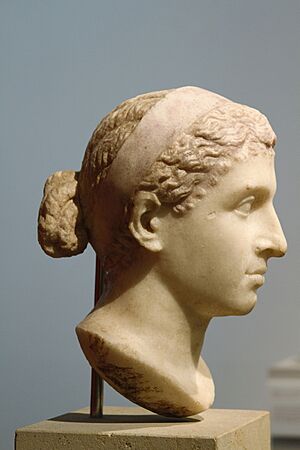
The Hellenistic civilization followed the classical period. It began after Alexander's death. This age saw many non-Greek cultures become partly "Hellenized," meaning they adopted Greek ways. This spread all the way to India. The Hellenistic age ended around 30 BC when Rome conquered Ptolemaic Egypt.
During this time, Greeks moved to larger cities. The importance of individual city-states decreased. These cities were part of bigger kingdoms ruled by Alexander's generals, called the Diadochi. Greeks still remembered their past by studying Homer and other classical writers. Being in contact with non-Greek people (called barbarians) in these new, diverse kingdoms helped Greeks keep their identity strong. Greek science, technology, and math reached their peak during this period.
In the Indo-Greek and Greco-Bactrian kingdoms, Greco-Buddhism spread. Greek missionaries helped bring Buddhism to China.
Greeks in the Roman Empire
Between 168 BC and 30 BC, the entire Greek world was conquered by Rome. Most Greek speakers lived under Roman rule. Even though the Romans were militarily stronger, they admired Greek culture. They were greatly influenced by Greek achievements. The Greek and Roman cultures blended to form a single Greco-Roman culture.
Religion changed a lot during this time. The old Greek religion slowly faded. New religions from the East, like the cults of Isis and Mithra, became popular. Greek-speaking communities helped spread early Christianity in the 2nd and 3rd centuries. Early Christian leaders and writers, like Saint Paul, often spoke Greek. However, Greece itself was slower to adopt Christianity. Some ancient Greek religious practices continued until the late 4th century.
Over time, being Christian became more important than ethnic differences in the Roman Empire. From the early centuries AD, Greeks called themselves Rhōmaîoi (Romans). By then, the name Hellenes usually meant pagans. But the term Hellenes was later revived in the 11th century to mean Greeks.
The Middle Ages and Byzantine Empire
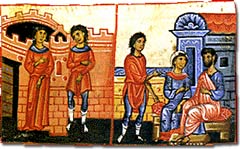
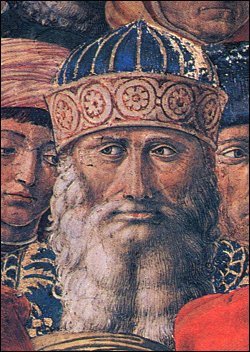
For most of the Middle Ages, Byzantine Greeks called themselves Rhōmaîoi (Romans). This term meant Christian Greeks. The Byzantine Empire (also known as the Eastern Roman Empire) became more Greek in culture after the 7th century. Emperor Heraclius made Greek the official language.
Western Europeans started calling the Eastern Roman Empire the "Empire of the Greeks" after the year 800. This was often to challenge their claim to be the true Roman Empire. However, the Byzantine Greeks themselves rarely used the term "Greeks" for themselves.
Scholars today have different ideas about this Byzantine Roman identity. Some see it as a shared identity for people of different backgrounds in a big empire. Others see it as a continuous Greek national identity. The Byzantine Greeks valued both Christianity and the ancient Greek traditions.
A clear Greek identity started to reappear in the 11th century among educated people. It became stronger after the Fourth Crusade captured Constantinople in 1204. After the Byzantines took back Constantinople in 1261, Rhomaioi became the main term again. But some thinkers, like George Gemistos Plethon, started using "Hellene" more. In the last years of the Byzantine Empire, combining Orthodox Christianity with a Greek identity became very important.
These Byzantine Greeks played a huge role in saving the writings of the classical era. Byzantine scholars brought ancient Greek studies to the West in the 15th century. This greatly helped the Italian Renaissance. Greek philosophy, especially that of Aristotle, was studied in the Greek world for almost 2,000 years.
The Byzantine Greeks also helped spread reading and Christianity to the Slavic world. Two famous Byzantine Greek brothers, Saints Cyril and Methodius, created the first Slavic alphabet.
Under Ottoman Rule
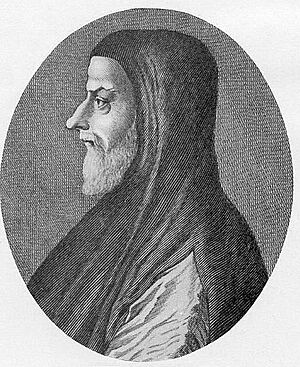
After Constantinople fell to the Ottoman Empire in 1453, many Greeks moved to Western countries. They sought better jobs and education. Greeks are often given credit for helping start the European cultural revolution, the Renaissance.
In the Ottoman Empire, Greeks became very important. This was partly because the empire's center was in areas with many Greeks. Greek speakers played a big role in Ottoman trade, diplomacy, and the church. Many men of Greek origin also served in the Ottoman army and government.
Under the Ottoman system, religion defined groups of people. So, the Ottomans called all members of the Eastern Orthodox Church "Greeks" (Rumlar). But Greek speakers were the only ones who called themselves Romioi. Educated Greeks also saw their ethnic group (genos) as Hellenic. Some Greeks avoided the lower status given to Christians by converting to Islam.
The success of Greeks in the Ottoman Empire came from their strong traditions of education and trade. Wealthy Greek merchants helped bring about an intellectual revival. This led to the Greek War of Independence in 1821. Important Greek learning centers were in major trade cities like Chios and Smyrna. Greeks also had a leading role in the Orthodox Church.
Modern Greek History

The Modern Greek Enlightenment helped promote education and culture among Greeks. It also pushed for independence from the Ottomans. Thinkers like Adamantios Korais encouraged using "Hellene" instead of "Romiós."
The connection between Greek identity and the Greek Orthodox Church continued after modern Greece was formed in 1830. In 1923, after a war, Greece and Turkey agreed to exchange populations. This meant people were moved based on their religion. Over a million Greeks were forced to leave Asia Minor and settle in Greece. This event, along with the Greek genocide, greatly reduced the Greek presence in Asia Minor.
What Defines Greek Identity?
The ways people have defined "Greekness" have changed over time. But it was never just about being a citizen of a Greek state. The ancient historian Herodotus said that Greek identity was based on:
- shared family background
- shared language
- shared religious places and traditions
- shared customs
In Western countries, "Greeks" usually means anyone who speaks the Greek language. This includes ancient, Byzantine, and modern Greek speakers. Byzantine Greeks called themselves Romaioi (Romans), Graikoi (Greeks), and Christianoi (Christians). They were the heirs of the Roman Empire, descendants of ancient Greeks, and followers of Christianity.
Before modern Greece was founded, scholars like Rigas Feraios emphasized the link between ancient and modern Greeks. The modern Greek state was created in 1829. This happened when Greeks freed part of their homeland from the Ottoman Empire. Many Greeks living abroad helped raise money and awareness for this cause.
Today, Greeks are an ethnic group defined by their Greek culture and mother tongue. It's not about citizenship, race, or religion. In ancient and medieval times, the Greek term genos also meant a common ancestry.
Names for Greeks
Greeks have used different names for themselves. In Homer's Iliad and Odyssey, common names for Greeks were Achaeans, Danaans, and Argives. These terms were used to show a common Greek identity. Homer also mentions "Hellenes" as a small tribe in Thessaly.
According to Greek myths, Hellen was the ancestor of the Hellenes. The philosopher Aristotle said that ancient Hellas was an area in Epirus. The English names Greece and Greek come from the Latin words Graecia and Graecus. These came from the name of the Graeci, who were early Greek tribes that settled in southern Italy.
Greek Continuity Over Time
The clearest link between modern and ancient Greeks is their language. It has been spoken for at least 3,400 years. This is one of the longest continuous language traditions in the world. From the beginning, being Greek was mainly about sharing a common culture.
During the later years of the Eastern Roman Empire, there was a Greek cultural revival. This included language, philosophy, and literature. This revival strengthened the feeling of connection to ancient Greece. Throughout history, Greeks have kept their language, alphabet, certain values, and cultural traditions. They have also kept a sense of being Greek, despite many changes over time. Recent studies show a genetic link and continuity between ancient and modern Greeks.
Where Greeks Live Today
Today, Greeks are the main ethnic group in Greece, making up 93% of the population. They are also 78% of the population in Cyprus. A large part of Greece's population growth came from taking in new lands and from 1.5 million Greek refugees after the 1923 population exchange with Turkey. About 80% of Greeks live in cities, with 28% in Athens.
Cypriot Greeks also have a history of moving to other countries, especially English-speaking ones. After the Turkish invasion of Cyprus in 1974, many Greek Cypriots left the island. Today, more than two-thirds of Greeks in Cyprus live in cities.
In the 1990s, many Greeks from Albania moved to Greece. The Greek minority in Turkey has shrunk to just a few thousand people. This happened after events like the 1955 Istanbul Pogrom. This effectively ended the long Greek presence in Asia Minor. Smaller Greek groups still live in other Balkan countries and around the Black Sea.
Greeks Around the World (Diaspora)
It's hard to say exactly how many Greeks live outside Greece and Cyprus. Census figures show about three million. But other estimates suggest around five to seven million worldwide. Many Greeks living abroad might not speak Greek or might have married into other cultures.
Important Greek communities are in New York City, Chicago, Boston, Los Angeles, Sydney, Melbourne, London, Toronto, Montreal, Vancouver, Auckland, and Sao Paulo.
Ancient Greek Communities
In ancient times, Greek traders and colonists spread Greek culture, religion, and language. They went all around the Mediterranean and Black Sea. This was especially true in Southern Italy (called "Magna Graecia"), Spain, southern France, and the Black Sea coasts.
Under Alexander the Great's empire, Greek rulers and culture spread to the Middle East, India, and Egypt. The Hellenistic period saw new Greek cities and kingdoms in Asia and Africa. Under the Roman Empire, Greeks moved easily across the empire. Greek became the main language in the eastern parts. Today, the Griko people in southern Italy, about 60,000 strong, might be a living link to these ancient Greek populations.
Modern Greek Communities
During and after the Greek War of Independence, Greeks living abroad helped the new state. They raised money and awareness. Greek merchant families had contacts in other countries. Many set up homes around the Mediterranean, in Russia, and in Britain. They traded, often in textiles and grain. These businesses often included the whole family. They also brought Greek schools and the Greek Orthodox Church with them.
As their businesses grew, some families became shippers. They were often financed by the local Greek community. With economic success, the Greek diaspora spread further to the Levant, North Africa, India, and the USA.
In the 20th century, many Greeks left their homelands for economic reasons. There were large migrations from Greece and Cyprus to the United States, Great Britain, Australia, Canada, Germany, and South Africa. This happened especially after World War II, the Greek Civil War, and the Turkish Invasion of Cyprus in 1974.
Recently, due to the Greek financial crisis, many Greeks have started moving abroad again. In 2011, over 23,000 Greeks moved to Germany, a big increase from previous years.
Greek Culture and Traditions
Greek culture has developed over thousands of years. It started with the Mycenaean civilization and continued through classical, Hellenistic, Roman, and Byzantine times. Christianity greatly influenced it. The Diafotismos (Greek Enlightenment) helped bring Greek culture back to life. It combined ancient and medieval elements that define it today.
The Greek Language
Most Greeks speak the Greek language. It is a unique branch of the Indo-European languages. Greek has the longest written history of any living language, over 2,500 years. The oldest Greek writings are in Linear B, from about 1450 BC. After the Greek Dark Ages, the Greek alphabet appeared around the 9th–8th century BC. The Greek alphabet came from the Phoenician alphabet. It then became the parent of the Latin, Cyrillic, and other alphabets.
The earliest Greek literary works are the Homeric epics. Famous scientific and math works include Euclid's Elements. The New Testament was originally written in Koine Greek.
Modern Greek shares features with other Balkan languages. It has also taken in many foreign words, especially from Western Europe and Turkish. In the 19th century, people wanted to emphasize Greece's ancient heritage. So, they created Katharevousa, an artificial form of Greek without foreign words, as the official language. But in 1976, the Greek Parliament made the spoken language, Dimotiki, the official one.
Modern Greek has many different dialects. These include Cypriot, Pontic, Cappadocian, Griko, and Tsakonian. Many Greeks also speak other languages like English, Albanian, or Turkish.
Religion of the Greeks
Most Greeks are Christians and belong to the Greek Orthodox Church. In the first centuries after Jesus Christ, the New Testament was written in Koine Greek. This is still the language used in Greek Orthodox Church services. Many early Christians and Church leaders spoke Greek.
There are also smaller groups of Greeks who are Roman Catholics, Greek Catholics, or Greek Evangelicals. Some Greeks follow other religions, including Jewish and Greek Muslims communities. About 2,000 Greeks are part of groups that practice Hellenic Polytheistic Reconstructionism, which is a revival of ancient Greek religion.
Greek-speaking Muslims mostly live outside Greece today. There are Christian and Muslim Greek-speaking communities in Lebanon and Syria. In the Pontus region of Turkey, there is a large community of Greek-speaking Muslims.
Greek Arts and Creativity
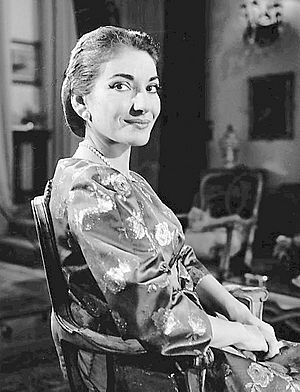
Greek art has a long and rich history. Greeks have made important contributions to visual arts, literature, and performing arts. In the West, classical Greek art greatly influenced Roman art and later Western art. After the Renaissance in Europe, Greek art inspired many European artists.
In the East, Alexander the Great's conquests led to centuries of cultural exchange. This resulted in Indo-Greek art and Greco-Buddhist art. These art forms even influenced Japan.
Byzantine Greek art developed from classical art. It adapted old pagan ideas to serve Christianity. This art style influenced many nations. Its impact can be seen from Venice in the West to Kazakhstan in the East. Greek art was also influenced by Eastern civilizations like Egypt and Persia at different times.
Many famous modern Greek artists include painters like Dominikos Theotokopoulos (El Greco) and Nikolaos Gyzis. Famous composers include Mikis Theodorakis and Vangelis. Singers like Maria Callas and Nana Mouskouri are well-known. Nobel Prize winners Giorgos Seferis and Odysseas Elytis are famous poets.
Other notable Greek artists include novelists like Nikos Kazantzakis and actors like Melina Mercouri. Important directors include Michael Cacoyannis and Theo Angelopoulos. Famous architects include Dimitris Pikionis.
Greek Contributions to Science
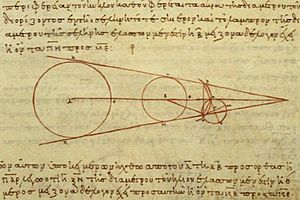
Greeks in classical and Hellenistic times made huge contributions to science and philosophy. They laid the groundwork for Western scientific traditions. These include astronomy, geography, historiography, mathematics, medicine, philosophy, and political science.
The tradition of learning continued during Roman times. There were many academic centers in cities like Constantinople and Alexandria. Byzantine science was a continuation of classical science. Greeks have always valued education. The first European institution called a university was founded in 5th century Constantinople. It operated until the city fell in 1453.
Today, Greece has a high percentage of students in higher education. Many Greeks living abroad are also active in education. Hundreds of thousands of Greek students attend universities around the world. Many leading universities have Greek names on their faculty lists.
Famous modern Greek scientists include:
- Physician Georgios Papanikolaou, who invented the Pap test.
- Mathematician Constantin Carathéodory.
- Archaeologists like Manolis Andronikos, who found the tomb of Philip II of Macedon.
- Computer scientists Michael Dertouzos and Nicholas Negroponte.
- Physicists like Demetrios Christodoulou.
- Economist Xenophon Zolotas.
- Historians like Constantine Paparrigopoulos.
Important engineers and car designers include Nikolas Tombazis and Alec Issigonis.
Greek Symbols
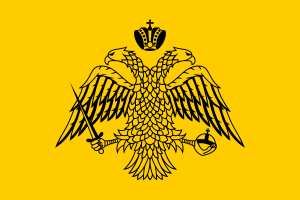
The most common symbol for Greeks is the flag of Greece. It has nine blue and white stripes. These stripes stand for the nine syllables of the Greek national motto: Eleftheria i Thanatos (Freedom or Death). This was the motto of the Greek War of Independence. The white cross in the corner represents Greek Orthodoxy. Greek Cypriots also widely use the Greek flag.
The older Greek flag, with a white cross on a blue background, is also often used. The national emblem of Greece has a blue shield with a white cross, surrounded by laurel branches.
Another well-known Greek symbol is the double-headed eagle. This was the symbol of the last ruling family of the Eastern Roman Empire. It is now the symbol of the Greek Army and the Church of Greece.
Politics and Government
Classical Athens is seen as the birthplace of Democracy. The word "democracy" appeared in the 5th century BC. It meant "rule of the people." This was different from aristocracy (rule by an elite group) or oligarchy (rule by a few). The Athenians, led by Cleisthenes, set up what is considered the first democracy in 508–507 BC. It was a form of direct democracy.
Democracy declined during the Hellenistic and Roman times. But it was revived in Western Europe much later. The ideas of the French Revolution were very important for the start of the Greek War of Independence. They also helped establish the modern Greek state.
Important modern Greek politicians include Ioannis Kapodistrias, who founded the first Greek Republic. Eleftherios Venizelos shaped modern Greece. Other notable figures are Konstantinos Karamanlis, who founded the Third Greek Republic, and Andreas Papandreou.
Greek Surnames and Names
Greek surnames started appearing around the 9th and 10th centuries. They often came from the father's name, like names ending in -opoulos or -ides. Other surnames came from jobs, physical traits, or places. Greek male surnames usually end in -s. In Cyprus, some surnames end in -ou. Many surnames have endings that show a specific region, like -akis for Crete. Some Greek surnames also have Turkish or Italian origins.
For first names, the main influences are Christianity and classical Greek culture. Children are usually named after their grandparents. The first boy is named after the paternal grandfather, and the second boy after the maternal grandfather. The same goes for girls. Greek names often have a shorter, more familiar version. Greeks usually don't use middle names. Instead, they use their father's first name as a middle name.
Greeks and the Sea
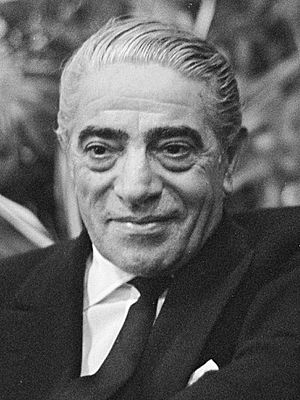
The traditional Greek homelands have always been connected to the sea. This includes the Greek peninsula, the Aegean Sea, southern Italy, the Black Sea, and the islands of Cyprus and Sicily. The ancient Greek philosopher Plato said, "we (Greeks) live around a sea like frogs around a pond." This shows how important the sea was. Since Greece is mostly rocky, the sea and trade were natural ways for Greeks to make a living.
Famous Greek sailors include Pytheas of Massalia, who sailed to Great Britain, and Nearchus, Alexander the Great's admiral. In later times, Byzantine Greeks controlled trade in the Mediterranean.
The Greek shipping tradition became strong again during Ottoman rule. A large merchant class developed. This group played a big part in the Greek War of Independence. Today, Greece has one of the largest merchant fleets in the world. Famous shipping leaders of the 20th century include Aristotle Onassis and Stavros Niarchos.
Greek Genetics
Studies of ancient DNA show that Minoans and Mycenaean Greeks were genetically very similar. Modern Greeks also resemble the Mycenaeans. This suggests that there has been a genetic connection between these ancient civilizations and modern Greeks. However, it also shows that populations in the Aegean region were not isolated.
These studies also found no evidence that Egyptian or Phoenician colonists started the cultures of the Aegean. This means that the idea that these cultures came from migrants from older civilizations in those regions is not supported by genetics.
Genetic studies using different markers show that Greeks share similar backgrounds with other Europeans. This is especially true for Southern Europeans like Italians and people from the Balkans (such as Albanians and Romanians). Some studies show Greeks are closest to Italians and Romanians. Other studies show they are close to Italians, Albanians, Romanians, and southern Balkan Slavs.
Greeks also have some Eastern European ancestry. This was acquired after 700 CE, when Slavic-speaking people arrived in the Balkans. However, the amount of this ancestry varies in different studies and regions.
Physical Appearance of Greeks
A study from 2013 looked at the hair and eye color of Greek people. It found that most had dark brown or black hair. A smaller number had blond or light brown hair. For eye color, most had brown eyes. A smaller number had blue or green eyes.
Another study in 2012 found similar results. Most young Greeks had brown hair, from light to dark. A good number also had black or blond hair. For eye color, most had dark brown eyes. About 15% had blue or green eyes.
A 2017 study of Bronze Age Aegean populations found that they mostly had dark hair (brown to black) and eyes. The genetic predictions matched how Greeks showed themselves in their art. This suggests that their art was realistic.
Timeline of Greek History
The history of the Greek people is closely tied to Greece, Cyprus, Southern Italy, Constantinople, Asia Minor, and the Black Sea. During Ottoman rule, some Greek areas were cut off from the main Greek lands. In the early 20th century, over half of all Greek speakers lived in Asia Minor (now Turkey). Later, many Greeks moved to the United States, Australia, Canada, and other places. This created the modern Greek diaspora.
|
|
See also
 In Spanish: Pueblo griego para niños
In Spanish: Pueblo griego para niños
- Antiochian Greeks
- Arvanites
- Cappadocian Greeks
- Caucasian Greeks
- Greek Cypriots
- Greek Diaspora
- Griko people
- Karamanlides
- Macedonians (Greeks)
- Maniots
- Greek Muslims
- Cretan Muslims
- Northern Epirotes
- Pelasgians
- Pontic Greeks
- Romaniotes
- Sarakatsani
- Tsakones
- Urums
- Lists
- List of ancient Greeks
- List of Greeks
- List of Greek Americans
 | Calvin Brent |
 | Walter T. Bailey |
 | Martha Cassell Thompson |
 | Alberta Jeannette Cassell |



